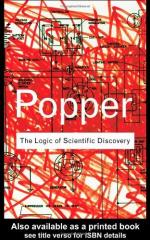
|
| Name: _________________________ | Period: ___________________ |
This test consists of 5 multiple choice questions, 5 short answer questions, and 10 short essay questions.
Multiple Choice Questions
1. With what does psychologism concern itself?
(a) Concept of demarcation.
(b) Questions of justification.
(c) Questions of fact.
(d) Logical analysis.
2. What does Popper fear philosophers will think about methodological investigations?
(a) There is no substance in them.
(b) They do not belong to philosophy.
(c) They do not work.
(d) They contradict years of thought.
3. How do conventionalists view Poppers beliefs on the underpinnings of new discoveries?
(a) Unwarranted.
(b) Good judgment.
(c) A collapse of science.
(d) Logical.
4. What types of statements have no logical justification in which to draw conclusions?
(a) Singular.
(b) Logical.
(c) Inferential.
(d) Circular.
5. What type of statement is deduced from universal statements?
(a) Logical.
(b) Singular.
(c) True.
(d) Assumed.
Short Answer Questions
1. Popper rejects perceptions because they tie into what type of principles?
2. What happens when theories are refined?
3. What challenges Poppers use of falsification as criteria in deciding is a theoretical system is empirical?
4. What does Popper consider to contribute to the cosmology of empirical science?
5. What is a precondition for rational consideration?
Short Essay Questions
1. How is causality related to tautological arguments?
2. What must be assumed to justify a universal statement?
3. What argument does Popper present against conventionalists and positivists regarding the testing of a theory?
4. What does Popper classify as being inductive statements?
5. Why does Popper discredit the conventionalist view of science?
6. What is the conventionalist view of science?
7. Why does Popper view positivism as narrow, limited, and misguided?
8. What is the distinction between universal statements and singular statements?
9. What type of questions or thoughts does Popper state are irrelevant to scientific knowledge?
10. How do methodological rules differ from logical or deductive rules?
|
This section contains 672 words (approx. 3 pages at 300 words per page) |

|




